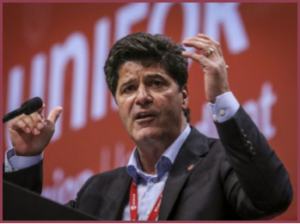 In round two of autoworker contract talks with the Detroit Three in Canada, Unifor upheld the pattern at FCA that was established when it took on a belligerent General Motors, which maintained no investment guarantees until after a contract. FCA’s Windsor, Ontario minivan plant – where new investment is now assured – is crucial to the success of the Chrysler Pacifica and Dodge Caravan in a segment that Chrysler invented. The proposed four-year deal also secures investment and jobs at Brampton and Etobicoke.
In round two of autoworker contract talks with the Detroit Three in Canada, Unifor upheld the pattern at FCA that was established when it took on a belligerent General Motors, which maintained no investment guarantees until after a contract. FCA’s Windsor, Ontario minivan plant – where new investment is now assured – is crucial to the success of the Chrysler Pacifica and Dodge Caravan in a segment that Chrysler invented. The proposed four-year deal also secures investment and jobs at Brampton and Etobicoke.
Unifor members vote on the tentative agreement this Sunday 16 October. If the new four-year contract is approved, Unifor will resume negotiations with Ford Motor Company. There are issues here as well with its Windsor, Ontario engine plant, whose future is also uncertain. (Ford Invests $1.6 Billion in Mexico. NAFTA Sucking Sound of Lost U.S. Jobs Continues During Fierce Presidential Race)
Unifor is Canada’s largest union in the private sector, representing more than 310,000 workers, including 23,050 members at Detroit Three automakers. Unifor was formed Labor Day weekend 2013 when the Canadian Auto Workers and the Communications, Energy and Paperworkers union merged.
FCA employs 10,000 members in Brampton, Etobicoke and Windsor. Unifor members make the Chrysler 300, Dodge Challenger and Dodge Charger (Brampton Assembly Plant), the Dodge Caravan and Chrysler Pacifica (Windsor Assembly Plant) and cast components (Etobicoke Casting plant).
 “It took many days and challenging conversations to get here, but we have a tentative agreement which includes investment commitments and matches the economic pattern established in the GM Agreement,” said Unifor National President Jerry Dias.
“It took many days and challenging conversations to get here, but we have a tentative agreement which includes investment commitments and matches the economic pattern established in the GM Agreement,” said Unifor National President Jerry Dias.
Dias led the negotiations from a much stronger bargaining position than was ever held by Bob White, Buzz Hargrove, Ken Lewenza, the former heads of the Canadian Auto Workers. The CAW, was originally part of the United Auto Workers Union until a complicated divorce split the unions in 1985.
“Entering into the 2016 negotiations the entire leadership at our auto locals unanimously endorsed investment commitments as our top priority. This objective was achieved with GM, and I am proud to report we were successful with FCA as well,” said Dias.
The first set of negotiations with GM – ironically, ala UAW style – established a bargaining pattern that included: investment commitments, 2% general wage increases in year one and four of the contract, a $6,000 ratification bonus, $2,000 lump sums payments in year two, three and four, benefit plan improvements and an “enhanced wage progression” for new hires.
FCA Canada said, “because the agreement is subject to Unifor member ratification, the Company cannot discuss the specifics of the agreement pending a vote by Unifor members.”


Before Mississippians and Mexicans learned to assemble cars — thanks to right-to-work and NAFTA — fate gave Ontario auto workers the upper hand 25 years ago. They’d thrown off the yoke of the UAW to form a union that put their interests first. And not only was the C$ worth a paltry 68 cents, but the idiocy of the U.S. system of tying health care to employment gave them an advantage (if memory serves) of $5,500/worker thanks to Canada’s universal healthcare system. GM was the world’s largest buyer of Viagra. Oshawa was (secretly) GM’s largest plant in the world; Honda and Toyota opened huge plants in Ontario.
Then NAFTA opened the door to Mexico, an oil-sands boom in Alberta brought the C$ up to parity with the $US, Canada’s government shunned investment subsidies, and GM/Chrysler shed their more ridiculous health/pension obligations in bankruptcy.
So since 2010 Canadian workers’ backs have been against the wall.But in past couple of years, C$ has dropped in value, so Unifor has some leverage but must use it carefully.